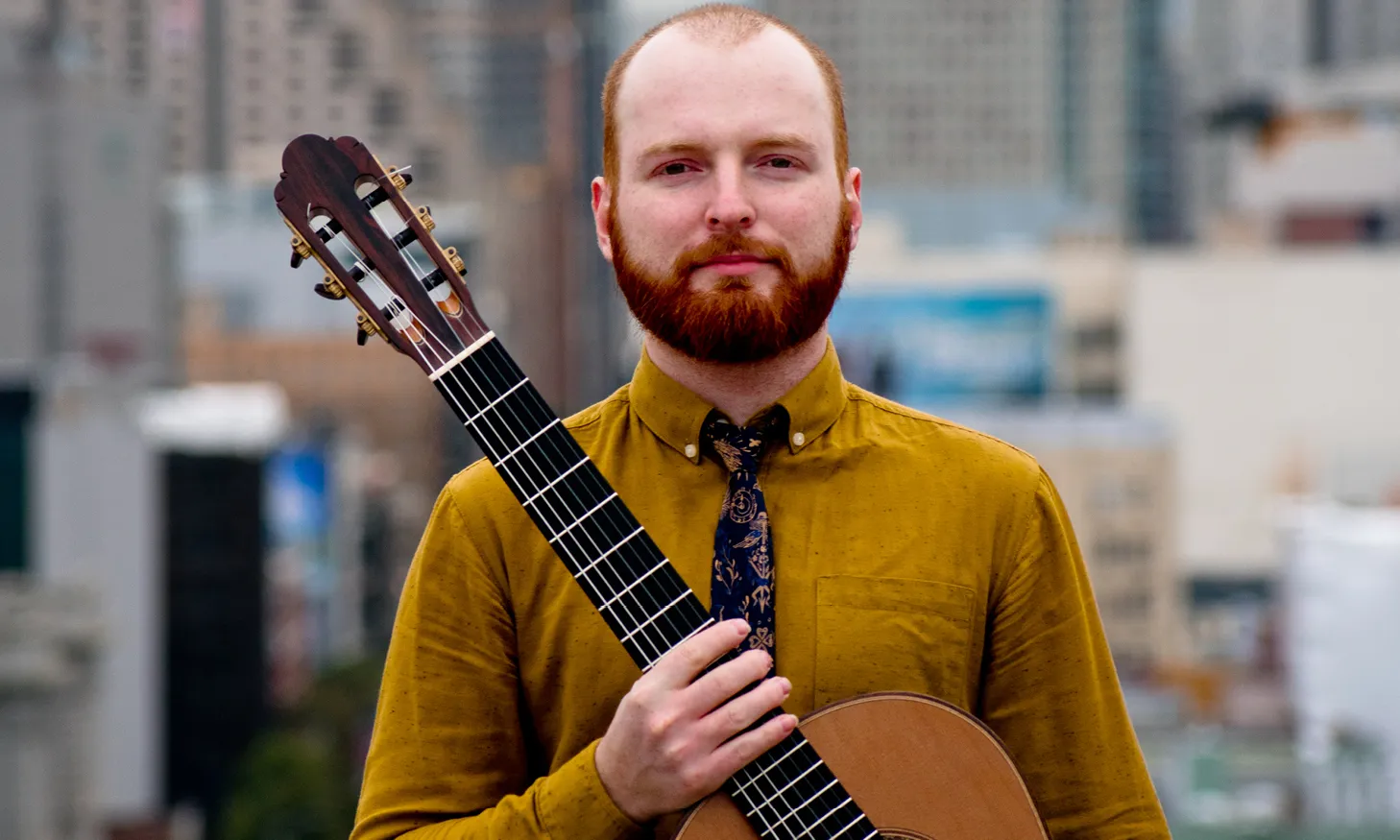by Stephanie Manning

Speaking from the stage with commentary that was both personable and concise, Topchii charmingly contextualized the music on his extensive program. Undercurrents, which he got to shortly after his opening shakeup, was the commissioned work for the Guitar Foundation of America’s 2023 Competition — an event where Topchii came out on top with the grand prize.
Thanks to his win, the Ukrainian guitarist has been touring the U.S. almost nonstop since September, with two months left to go. But at his visit to the Cleveland Classical Guitar Society, his relaxed speaking and focused performance belied the inevitable stressors of that schedule. Frederic Hand’s piece combines a variety of techniques and musical fragments, like a multicolored quilt — and the guitarist beautifully stitched them all together.
The recital’s centerpiece was J.S. Bach’s Partita No. 2 in c, arranged by French guitarist Tristan Manoukian. The counterpoint sits beautifully on the instrument, and Topchii easily could have passed it off as a guitar original. He told the audience of late nights spent practicing the middle four movements, learning them in just a month, but a brief memory slip hardly cramped his style. At the end of each movement, he barely paused, eagerly moving onto the next while the last note was still ringing.
The other keyboard arrangement was Topchii’s own — the first-movement “Modéré” from Maurice Ravel’s Sonatine. The guitarist spent a lot of time with his eyes closed during this gentler interpretation, listening intently and displaying his habit of tweaking his tuning pegs mid-piece. He felt equally in communion with Arnaud Dumond’s Comme un Hommage à Ravel, and its easy-to-follow melody.
Post-intermission, Topchii returned with a sparkly black jacket and shoes to match. “Costume change — that is exactly what we need,” he said playfully. Francis Poulenc’s gentle Sarabande transitioned seamlessly into John Dowland’s Chromatic Fantasy, despite the almost four hundred years between the two compositions.
The rest of the program displayed Topchii’s penchant for both popular and uncommon selections. Agustín Barrios Mangoré’s Un Sueño en la Floresta certainly falls in the familiar camp, but the guitarist opted for a less calming and more insistent interpretation, with some dramatic tempo shifts.
Mauro Giuliani’s Six Variations (Op. 49), on the other hand, is a rarely-played piece that starts off quaint before the variations become devilishly difficult. Both audience and performer found plenty of humor in the piece’s complexity and fakeout endings, which Topchii tossed off with aplomb. Leo Brouwer’s La Gran Sarabanda bubbled with playful trills and accented strumming, while Joaquín Rodrigo’s Toccata strikingly embodied Spanish style and flair.
Clocking in at almost two hours, the evening did begin to drag towards the end. A more natural stopping point occurred around midway through the second half, after Graham Koehne’s A Closed World of Fine Feelings and Grand Design. With a deceptively simple chord progression, this gorgeous piece felt deeply personal and nostalgic. Topchii mentioned that he himself cried the first few times performing it, and some audience members wiped their eyes as the piece wound down, settling to a stop like the last few notes from a childhood music box.
The Brouwer and Rodrigo followed before Topchii chose his encore. It was his mother’s piece from the very beginning, meaning he treated us to the same music two times in one night — a final act of convention-breaking.
Published on ClevelandClassical.com March 20, 2025.
Click here for a printable copy of this article



